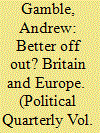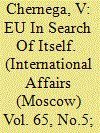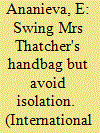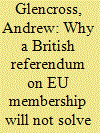| Srl | Item |
| 1 |
ID:
117483


|
|
|
|
|
| Publication |
2012.
|
| Summary/Abstract |
The largest ever rebellion of Conservative MPs on Europe took place in October 2011 with 81 Conservative MPs defying the Conservative whip to vote for a referendum on Britain's continued membership of the European Union. This resurgence of dissent over Europe has been fuelled by the crisis in the eurozone. The Conservative party is now an overwhelmingly Eurosceptic party, but Conservative Eurosceptics are divided over whether the Government should use the opportunity of the eurozone crisis to take Britain out of the European Union, or whether it should seek to negotiate a looser arrangement, or do nothing at all. Conservative policy on Europe has been further complicated by the coalition with the Liberal Democrats, and by the consequences for the British economy if the eurozone disintegrates. Public opinion is also divided. British policy on the European Union remains ambivalent and muddled because British aims are inconsistent, and because there is no consensus on where Britain's interests truly lie.
|
|
|
|
|
|
|
|
|
|
|
|
|
|
|
|
| 2 |
ID:
169527


|
|
|
|
|
| Summary/Abstract |
ELECTIONS to the European Parliament that took place on May 23-26. 2019 reflected the far from simple processes that have been unfolding in the European Union for several years now. They confirmed the desire of a fairly big number of voters to see new people among the political elites. The Right and Left centrists that had dominated the parliament for many years lost their traditional majority and, therefore, the chance to elect the chairman among themselves. This was not the only surprise.
|
|
|
|
|
|
|
|
|
|
|
|
|
|
|
|
| 3 |
ID:
138050


|
|
|
|
|
| Summary/Abstract |
THE BAFFLED European and international media described the results of the May 2014 elections to the European Parliament as revolutionary. On the eve, there had been a lot of talk that the traditional parliamentary majority could be pushed aside; immediately after the elections, the result looked as a political earthquake of sorts.
|
|
|
|
|
|
|
|
|
|
|
|
|
|
|
|
| 4 |
ID:
120567


|
|
|
|
|
| Publication |
2013.
|
| Summary/Abstract |
ON NOVEMBER 22-23, 2012, the extraordinary EU summit met in Brussels to discuss the EU budget despite the rumors that the UK might veto its decisions thus making the summit useless and even cancel it. The Brussels summit convened to discuss the next long-term budget for 2014-2020, the Multiannual Financial Framework (MFF) failed to deliver. Normally, the European Union needs two summits to reach a budget agreement. This time, President of the European Council (the EU highest political body consisting of heads of state and government of the member-states) Herman Van Rompuy should be ready with a new draft MFF by February 2013, the time of the next budget summit.
|
|
|
|
|
|
|
|
|
|
|
|
|
|
|
|
| 5 |
ID:
138348


|
|
|
|
|
| Summary/Abstract |
This article scrutinizes the merits of holding a referendum over UK membership of the EU. It queries the assumption that direct democracy can somehow resolve the longstanding Europe question in British politics. To do this, the analysis traces the existence of an exceptionalist approach to the EU within Britain, now associated with re-negotiating UK membership in the shadow of a referendum. The article argues that the prospects for a radical reconfiguration of the UK's treaty obligations are slim, thereby increasing the risk of a vote to withdraw. Yet withdrawal would be the opposite of a simple solution to the Europe question. Political and economic interests dictate lengthy politicking over a highly complex post-Brexit settlement revisiting free movement of goods, services, capital and people. Such negotiations undermine any mooted cathartic benefits of a popular vote, while Eurosceptics will remain dissatisfied in the event of a yes, a result likely to further destabilize the Conservative Party. Consequently, the simplicity and decisiveness that a referendum—particularly one that spurns the EU—promises is merely a mirage as relations with the EU necessarily form part of an enduring British political conversation.
|
|
|
|
|
|
|
|
|
|
|
|
|
|
|
|